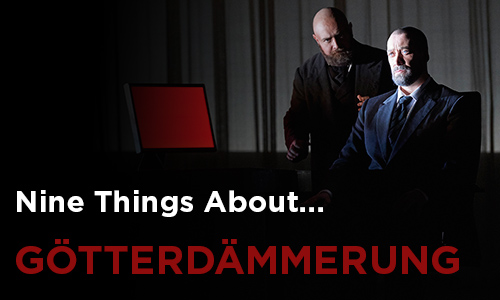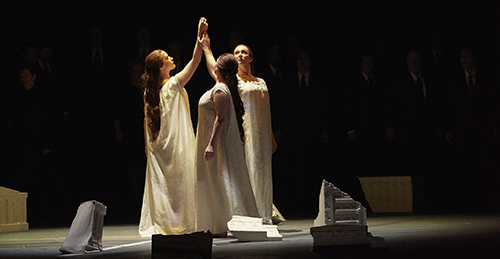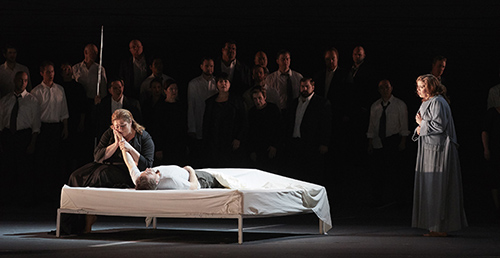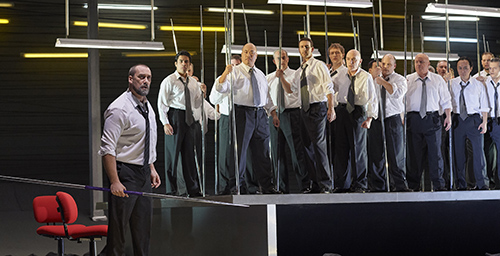-
Nine Things About Götterdämmerung!
By Tanner DaviesPosted in GotterdammerungBy Nikita Gourski, Development Communications Officer

Deceit, betrayal, and revenge—assisted by magic potions—drive the drama in this final
instalment of Siegfried’s journey. Do you need to brush up on your Ring Cycle knowledge or simply want to learn more about our upcoming production? Here are Nine Things About Götterdämmerung!
Wagner’s Far-reaching influence
Richard Wagner (1813–1883) is without a doubt one of the most important and controversial artists in human history. His influence extends far beyond music and has touched all aspects of modern culture, from literature, poetry, fine arts, and cinema, to literary theory, politics, philosophy, and more. Renowned music critic Andrew Porter has claimed that “No artist has been more influential than Wagner.”
The Ring Cycle comes to a close
Der Ring des Nibelungen, Wagner’s massive cycle comprising four interconnected operas, took approximately 26 years to compose. Music critic Alex Ross has pointed out that the Ring’s entire score is “more than two thousand printed pages [and if the music were played from beginning to end] would last from morning until midnight… arguably, the most ambitious work of art ever attempted.” The COC opened its opera house, the Four Seasons Centre for the Performing Arts, with the Ring Cycle in 2006 and more recently presented three of the Ring’s four operas over consecutive seasons: Die Walküre (2015), Siegfried (2016), and Götterdämmerung (2017).

It’s the end of the world
In Götterdämmerung, which translates to “Twilight of the Gods,” the multi-generational epic that began with Wotan’s theft of a magic ring—precipitating a curse and prophesy of doom—comes to a stunning resolution that sees the world of gods and humans falling to the flames of destruction. Yet the end is also the beginning, as the opera leaves open the possibility of rebirth and renewal, and perhaps a better world to be remade from the debris of our faults.
Text backwards, music forwards
In one sense, Wagner wrote his Ring Cycle “backwards,” starting with the end of Götterdämmerung and elaborating the events that took place before its conclusion. Once he had the text of the narrative written, he began to compose the music going “forwards.” Yet the process wasn’t as linear or simple as the music fitting to an unchanging textual mould. Over time—more than two decades of work—Wagner’s philosophical outlook, musical style, and worldview all went through significant, sometimes intense, changes; the text was altered and revised, reduced and expanded, revised again, becoming layered with the accumulated history of a shifting psyche and an evolving personal and political consciousness. Most notably Wagner experimented with many variations on Götterdämmerung’s ending, which ran the gamut from uplifting optimism, in its initial incarnation, to later expressions of resigned fatalism. Ultimately he settled on an option of rich ambiguity, prioritizing musical expression over any definitive textual summation: “[Understanding the opera’s conclusion] is more a matter of feeling than of subtle arguments… I have once again realized how much of the work’s meaning is made clear only by the music.”

The pinnacle of Wagner’s art
Götterdämmerung features some of the most complex and riveting music in the operatic repertoire, including Siegfried’s “Funeral March”—an orchestral showcase which offers a musical retrospective of the Ring itself—as well as Brünnhilde’s famous “Immolation” scene, a powerful aria in which she restores order to the world and joins Siegfried on his burning pyre in an act of profound sacrifice.
A debut for Johannes Debus
With this production, COC Music Director Johannes Debus conducts his first Götterdämmerung. During our recent multi-season exploration of the Ring Cycle, Debus has been at the podium for both Die Walküre and Siegfried, earning extensive acclaim for his work. “A piece like Götterdämmerung is far more universal than I expected. That’s the thing that surprised me. We all know that Wagner was highly interested in Greek tragedy. And that’s what he goes back to—those really elementary everlasting human questions. At the end of the opera, as depressing as it has been, you can see a sign, I think, that says, ‘Hope. …’”
A highly acclaimed production
Director Tim Albery’s vision for Götterdämmerung was first presented by the COC in winter 2006, and then in fall 2006 as part of the company’s full Ring Cycle. It has been called “as stunning a feat of staging as [has been] seen in Toronto” (National Post), with critics singling out that “the great virtue of Albery’s production is the urgency and absolutely clarity of the storytelling” (Opera News), while also noting the presentation as a whole represents “the COC’s proudest hour” (Globe and Mail).

Visual language of the modern
The production designer Michael Levine worked on all four COC Ring operas, acting as a unifying architect of the cycle and giving it a coherent visual progression from opera to opera. He sets Götterdämmerung in a world that is recognizably ours, sleekly corporate and computerized, with business suits and modern dress. Yet the use of space and shadow, the dramatic lighting by designer David Finn, also produces an undercurrent of strangeness, as if this is a world that touches ours but simultaneously remains of another realm entirely.
A generation-defining cast of voices
American soprano Christine Goerke as Brünnhilde
“Everything a great Brünnhilde must have: dignity, stature, and a voice of molten gold” (Toronto Star); “a once-in-a-decade experience” (Globe and Mail)
Austrian tenor Andreas Schager in his COC debut as Siegfried
Establishing himself as one of the world’s leading heroic tenors: a “discovery” (The Arts Desk) and “a big star in the making” (The Independent)
German baritone Martin Gantner as Gunther
Internationally renowned at the world’s most important opera houses, such as Bayerische Staatsoper, Opéra National de Paris, Opernhaus Zürich, Metropolitan Opera, etc.
Estonian bass Ain Anger in his COC debut as Hagen
“One of the great opera basses of our time” (The Guardian) makes his Canadian and role debut
Canadian bass Robert Pomakov as Alberich
“A talent to watch” (Washington Post)
Canadian soprano Ileana Montalbetti as Gutrune
COC Ensemble Studio graduate, whose performance as Ellen Orford in the COC’s Peter Grimes (2013) was “in the realm of greatness” (Toronto Star)
Götterdämmerung is on stage at the Four Seasons Centre for the Performing Arts from February 2 to 25. For more information and to purchase tickets, click here.
Photo credits (top - bottom): (l-r) Robert Pomakov and Ain Anger in Götterdämmerung (COC, 2017), photo by Michael Cooper; (l-r) Lauren Eberwein, Danika Lorèn and Lindsay Ammann in Götterdämmerung (COC, 2017), photo by Michael Cooper; (l-r, foreground) Christine Goerke, Andreas Schager and Ileana Montalbetti in Götterdämmerung (COC, 2017), photo by Michael Cooper; Ain Anger (far left) in Götterdämmerung (COC, 2017), photo by Michael Cooper.
_20240704163452_0.png)